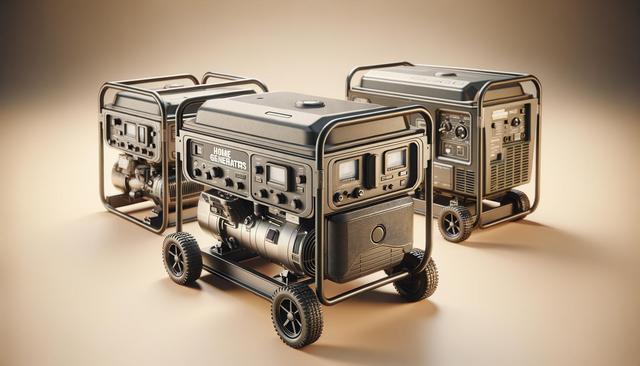Understanding the Need for Home Generators
In recent years, households across various regions have experienced an increase in power outages due to extreme weather events, aging infrastructure, and rising energy demands. These disruptions can pose significant inconveniences and even safety concerns. Home generators offer a practical solution, providing a dependable source of backup power when the grid fails. They allow essential appliances like refrigerators, heating systems, and medical devices to continue functioning, ensuring comfort and security during uncertain times.
Generators tailored for home use come in different sizes and configurations, catering to varying energy needs. Some homeowners opt for smaller, portable models, while others invest in larger standby systems that activate automatically during an outage. Choosing the right generator involves evaluating a home’s energy consumption patterns, prioritizing critical appliances, and understanding the fuel sources available—such as propane, natural gas, or diesel. As the frequency of outages continues to rise, more people are recognizing the value of having a home generator ready to go.
Types of Home Generators and Their Features
When exploring generator options, homeowners typically decide between two main categories: portable and standby generators. Each type serves a different purpose and varies in terms of installation, power capacity, and convenience.
- Portable Generators: These are compact and can be moved easily. They are often powered by gasoline and require manual setup during an outage.
- Standby Generators: Permanently installed and connected to a home’s electrical system, these units turn on automatically when the power goes out. They are often fueled by natural gas or propane.
Beyond the basic categories, many models include features that enhance performance and ease of use. Some offer remote monitoring capabilities, allowing users to track performance and fuel levels via smartphone apps. Others are designed with noise-reducing technology, making them more suitable for residential neighborhoods. It’s important to consider factors such as runtime, wattage capacity, and ease of maintenance when evaluating which generator model fits best with your household needs.
Fuel Sources: Making the Right Choice
The fuel type a generator uses can significantly impact its operation and cost-effectiveness. Understanding the pros and cons of each option helps homeowners make an informed decision that aligns with their energy goals and local infrastructure.
- Gasoline: Commonly used in portable generators, gasoline is widely available but requires careful storage and has a shorter shelf life.
- Propane: Known for clean burning and long-term storage, propane is often used in standby systems. However, it may deliver slightly less power output than gasoline or diesel.
- Natural Gas: Ideal for standby generators connected to municipal lines, natural gas offers convenience and continuous fuel supply but isn’t available in all areas.
- Diesel: Offers efficiency and durability but produces more emissions and can be more costly in the long run.
Choosing the right fuel source depends on factors such as generator size, frequency of use, and accessibility of fuel in your area. Some homeowners prioritize environmental impact, while others focus on cost and long-term availability. In either case, understanding your options is key to selecting a generator that performs reliably during extended outages.
Trusted Generator Models and What Sets Them Apart
With growing demand, the market now offers a broad range of home generators known for their reliability and performance. While specific brand names are not the focus here, many of the most trusted models share common characteristics that make them stand out.
Among the highly rated options, several traits are consistently praised by users:
- Automatic transfer switches that immediately shift power from the grid to the generator
- Quiet operation that minimizes disruption during use
- Weather-resistant enclosures ideal for harsh outdoor conditions
- Long warranties and accessible customer support
- Compliance with regional safety and emissions standards
Consumer reviews often highlight models that provide consistent start-up performance and integrate well with smart home systems. It’s also worth noting that reputable models typically come with robust safety features, such as overload protection and carbon monoxide sensors. These aspects contribute to peace of mind, especially when a generator is expected to run for extended periods during emergencies.
Installation, Maintenance, and Safety Considerations
Installing a home generator involves more than simply purchasing a unit. Proper placement, professional installation, and regular maintenance are essential to ensure safe and effective operation. Standby generators especially require assessment by a licensed technician to determine load requirements and connect the system to fuel lines and the home’s electrical panel.
Here are some key installation and maintenance tips:
- Choose a well-ventilated outdoor location, away from windows and doors
- Have a certified electrician handle the connection to your home’s power supply
- Schedule regular inspections and oil changes, particularly before storm seasons
- Test your generator periodically to ensure it starts and runs correctly
From a safety standpoint, it’s critical to operate generators according to manufacturer guidelines. Portable units should never be used indoors or in enclosed spaces due to carbon monoxide risks. Additionally, storing fuel safely and keeping the equipment clean can extend the lifespan of your generator and reduce the risk of fire or malfunction. By maintaining your system and staying informed about proper operation, you can rely on your generator when you need it most.
Conclusion: Power Security Starts at Home
As power outages become more frequent, the importance of home generators continues to grow. Whether you’re looking for a portable unit for occasional use or a fully integrated standby system for seamless power backup, understanding your options is the first step toward energy security. By evaluating fuel types, installation requirements, and trusted features, you can choose a generator that supports your household’s unique needs. Investing in a reliable generator not only safeguards your comfort during outages but also offers long-term peace of mind.




Leave a Reply